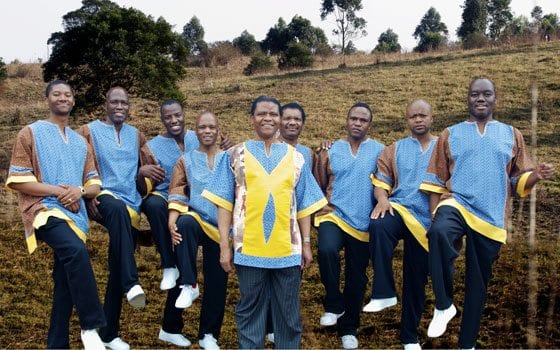
The vocal stylings of South African acapella group Ladysmith Black Mambazo had the crowd howling in astonishment Sunday night at the Sanders Theatre.
Touring to promote their new album “Songs from a Zulu Farm,” Ladysmith Black Mambazo spreads peace, love and unity through song. For more than 40 years, the group has performed on stages all around the world and released more than two-dozen recordings.
Joseph Shabalala, now 70, started the three-time Grammy Award-winning group in the 1960s. He took the name “Ladysmith” from the town he is from, “Black” is a reference to oxen and “Mambazo” is the Zulu word for axe. According to Shabalala, the group thus uses their voices to pave the way for other traditional groups.
After appearing on Paul Simon’s 1986 recording “Graceland,” the group garnered international fame. The following year Simon produced the group’s first United States album release “Shaka Zulu.” Ladysmith went on to work with Stevie Wonder, Melissa Etheridge, Dolly Parton and others. They performed in Michael Jackson’s “Moonwalker” movie, provided soundtrack material for Disney’s “The Lion King” and did a series of popular Lifesaver’s commercials in the 1990s.
Bursting onstage in African garb and red socks, Ladysmith went straight into song without fanfare. Harmonizing under the rich wooden arch, Ladysmith’s singing was disciplined and precise. Their intricate jumping, kicking and flipping had audience members clapping with delight.
Unlike American conductors who face singers or instrumentalists to direct, Shabalala — whose four sons sing in the group — faces the crowd and leads the songs with confidence. The singers crescendo and decrescendo with a slight wave of their leader’s hand; a look over the shoulder moves them to the chorus and a hop of his feet makes them refrain.
Ladysmith sang of beautiful mountains, ill-tempered chickens and butt-biting donkeys. Chants complete with whispers, growls and tongue clicks easily transported listeners to South Africa. Their sound effects made the simple themed songs organic and fun.
A couple of days before the show, the Banner got a chance to chat with tenor Albert Mazibuko about how being a member of Ladysmith Black Mambazo has affected South Africa and changed his life.
“Isicathamiya” (is-cot-a-ME-Ya) seems a lot like Negro Spirituals, which African Americans developed as a result of slavery. What are your thoughts?
I think it’s very close to that situation. People sang while they were away from home working in the mines to comfort themselves. But when Zulu people sing and entertain we end up dancing. But that’s when the problems started. The stomping would wake up the guards (at the railroad sites) so they started to tip toe. Soon they were called the tiptoe guys. Isicathamiya.
Who does the writing and arranging of the music?
Most of the writing is done by Joseph Shabalala, but the group gets lots of input. He will bring us a song and we will discuss it.
Why do you think such spiritual music has been successful in such a seemingly secular world?
I think it’s because every human being has a spiritual part in their lives. Gospel music is popular everywhere because it is the only music that touches lives and connects people.
How has touring with the group changed your life?
It changes my life daily. It is a gift. I cherish it. I also learned how to speak English. Traveling, meeting new people and listening to American music helped me learn. The music [of a people] will teach you about the language. Music is universal.
What has the success of Ladysmith Black Mambazo done for South Africa?
When we met Nelson Mandela, he told us that we were an inspiration. People have told us that our singing uplifts them and makes them stronger. Hopefully, that’s true in South Africa and all around the world.






